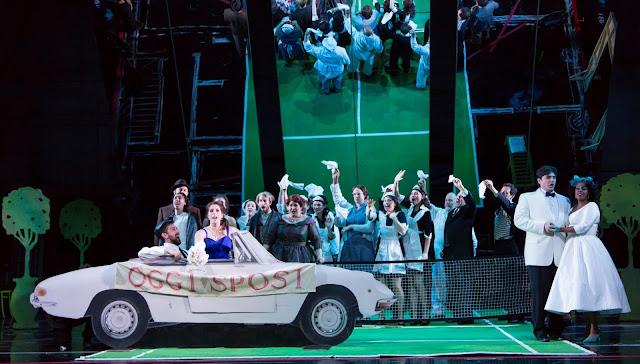 |
| Emily Birsan & Evan Hughes in "The Marriage of Figaro" (photo: T. Charles Erickson) |
Mozart's
The Marriage of Figaro
is a challenging undertaking for an opera company to mount, but
Boston Lyric Opera is surely up to the task. Among other hurdles, it
requires no fewer than thirteen singers: two each of bass-baritones,
tenors, and baritones, as well as three mezzo-sopranos and four
sopranos, most of them principal roles. When he composed this opera
buffa in 1786 to a libretto by
Lorenzo da Ponte, though, Mozart would surely never have expected to
see the work performed with as many distractions as the current
production has, including major acoustic problems with the venue at
John Hancock Hall, but more about that later. For the moment, here
is a very brief reminder of all that transpires in this multi-plotted
work.
Figaro (bass-baritone Evan Hughes) and Susanna (soprano
Emily Birsan), servants in an Italian villa in the 1950's (updated by
a couple of centuries), are to be married, but their employer,
sportscar enthusiast (in this production) Count Almaviva (baritone
David Pershall) has been ogling the bride-to-be (droit
d'employeur?). Meanwhile, the housekeeper for Doctor Bartolo
(baritone David Cushing), Marcellina (soprano Michelle Trainor),
wants Figaro for herself (and, to complicate things further, he owes
her money). But this will prove impossible, for relative reasons
(the sort of “reveal” that Gilbert and Sullivan were much later
to make such fun of). Susanna, who is maid to the Countess Almaviva
(soprano Nicole Heaston), conspires with her to outwit the Count by
dressing the Count's teenaged male page, Cherubino (mezzo-soprano
Emily Fons) as a girl. Things get a bit mixed up, though, and
Cherubino ends up falling into the garden where he's caught by the
Gardner (and Susanna's uncle) Antonio (bass-baritone Simon Dyer).
Susanna promises the Count a tryst, and things get far too complex to
enumerate here. Also involved are Antonio's daughter Barbarina
(soprano Sara Womble) with her aria that is inexplicably the sole
solo written in a minor key; a music teacher, Basilio (tenor Matthew
DiBattista); a judge, Don Curzio (tenor Brad Raymond); and two
bridesmaids (mezzo-sopranos Felicia Gavilanes and Emma Sorenson). In
the end, loose ends are tied up and the honeymoon car arrives.
 |
| The Cast at the Finale of "Marriage of Figaro" (photo: T. Charles Erickson) |
The performance was meticulously Conducted by David
Angus, with controversial Stage Direction by Rosetta Cucchi, unusual
Set Design by John Conklin, lovely Costume Design by Gail Astrid
Buckley and apt Lighting Design by D. M. Wood. The technical
elements were all one would expect from this company, especially the
rather unorthodox placement of a huge slanted mirror and chalked
floor spaces that Cucchi describes in the program notes as reflecting
two films, the 1954 Sabrina and the 2003 Dogville (in
which the chalked areas were equally strange and diverting in a bad
way). The on-stage presence of supernumeraries who were almost
constantly called upon for set changes, prop supplying and
complicated stagehand coordination helped keep the multiple plots in
play, but ended up adding to the distracting goings-on that were
usually irrelevant to the libretto, though accomplished with
precision and lightheartedness. Once again with this company,
though, the mounting of the work proved to be unnecessarily busy.
Just because this opera is so well-known and often performed doesn't
mean our minds would wander if left to the music of the moment.
That said, any production of this opera demands singers
who can act, and in that regard the composer would have been quite
pleased indeed. Hughes and Birsan made a believable couple who could
deliver musically and convey the lightness and poetry of the piece
with genuine musicality and sparkling presence. The same could be
said for Fons in full Keith Urban getup, as well as Pershall and
Heaston, representing the upper classes (perhaps of less impact in
the 1950's); Heaston in particular brought the house down with an
exquisite rendering of the Countess' aria. But then the entire cast
impressed with the level of apparent ease with such difficult music,
including the BLO Chorus under Michelle Alexander's direction. It
was a shame that the hall didn't perform as well as they did. Though
the makeover of the venue is visually pleasant, the acoustics are not
conducive to a crisp, responsive performance space; it was as though
one were revisiting one's dusty treasure trove of monaural LPs.
Thankfully, none of next season's offerings is scheduled for John
Hancock Hall.
Any opportunity to see and hear Mozart at his wittiest,
performed so brilliantly, is a chance that shouldn't be missed,
however. When that honeymoon vehicle finally arrives after three
hours of plot points, one needs no translation for the phrase with
which it is so amusingly bedecked: oggi sposi.
Repeat perfs: Sun.Apr.30 at 3:30pm, Weds.May 3 at 7pm, Friday May 5 at 7p & Sun.May 7 at 3:30p.
Repeat perfs: Sun.Apr.30 at 3:30pm, Weds.May 3 at 7pm, Friday May 5 at 7p & Sun.May 7 at 3:30p.










